- Clone
- 8F11-M16 (See other available formats)
- Regulatory Status
- RUO
- Other Names
- Chemokine (C-X-C motif) receptor 7, RDC1, CMKOR1, GPR159
- Isotype
- Mouse IgG2b, κ
- Ave. Rating
- Submit a Review
- Product Citations
- publications
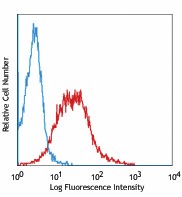
-

CXCR7 transfected mouse L1.2 cells stained with 8F11-M16 PE
| Cat # | Size | Price | Quantity Check Availability | Save | ||
|---|---|---|---|---|---|---|
| 331103 | 25 tests | £139 | ||||
| 331104 | 100 tests | £271 | ||||
CXCR7, also known as RDC1, belongs to a subgroup of C-X-C chemokine receptors, which are part of a large protein family of G protein-coupled receptors (GPCR). CXCR7 binds with high-affinity to CXCL12/SDF-1 and CXCL11/I-TAC, which regulates the trafficking and activation of leukocytes. It is also a co-receptor for the entry of HIV-1. Binding of ligand to CXCR7 induces proliferation and migration of immature neurons, glia and their precursors. CXCR7 expression occurs on a wide variety of tissues and cells including monocytes, B cells, T cells and mature dendritic cells. Surface expression of CXCR7 was also reported to be on tumor cells, activated endothelial cells, fetal liver cells, and other cell types.
Product DetailsProduct Details
- Verified Reactivity
- Human, Mouse
- Antibody Type
- Monoclonal
- Host Species
- Mouse
- Immunogen
- Human CXCR7 transfectant
- Formulation
- Phosphate-buffered solution, pH 7.2, containing 0.09% sodium azide and BSA (origin USA)
- Preparation
- The antibody was purified by affinity chromatography, and conjugated with PE under optimal conditions.
- Concentration
- Lot-specific (to obtain lot-specific concentration and expiration, please enter the lot number in our Certificate of Analysis online tool.)
- Storage & Handling
- The antibody solution should be stored undiluted between 2°C and 8°C, and protected from prolonged exposure to light. Do not freeze.
- Application
-
FC - Quality tested
- Recommended Usage
-
Each lot of this antibody is quality control tested by immunofluorescent staining with flow cytometric analysis. For flow cytometric staining, the suggested use of this reagent is 5 µl per million cells in 100 µl staining volume or 5 µl per 100 µl of whole blood.
- Excitation Laser
-
Blue Laser (488 nm)
Green Laser (532 nm)/Yellow-Green Laser (561 nm)
-
Application References
(PubMed link indicates BioLegend citation) - Product Citations
-
- RRID
-
AB_1227620 (BioLegend Cat. No. 331103)
AB_1227619 (BioLegend Cat. No. 331104)
Antigen Details
- Structure
- G protein-coupled receptor super family
- Distribution
-
Monocytes, B cells, T cells and mature dendritic cells
- Ligand/Receptor
- CXCL12/SDF-1 and CXCL11/I-TAC
- Cell Sources
- On a wide variety of tissues and cells including monocytes, B cells, T cells and mature dendritic cells
- Cell Type
- B cells, Dendritic cells, Monocytes, T cells
- Biology Area
- Immunology
- Molecular Family
- Cytokine/Chemokine Receptors, GPCR
- Antigen References
-
1. Burns JM, et al. 2006. J. Exp. Med. 203:2201.
2. Infantino S, et al. 2006. J. Immunol. 176:2197. - Regulation
- Regulates the trafficking and activation of leukocytes
- Gene ID
- 12778 View all products for this Gene ID 57007 View all products for this Gene ID
- UniProt
- View information about CXCR7 on UniProt.org
Related FAQs
- What type of PE do you use in your conjugates?
- We use R-PE in our conjugates.
- Does staining at room temperature or even at 37°C help for checking chemokine receptors expression?
-
Due to continuous recycling of many chemokine receptors, it may be worthwhile to consider staining at room temperature or at 37°C if the staining at lower temperature (which can potentially reduce receptor turnover) is not optimal.
Other Formats
View All CXCR7 Reagents Request Custom Conjugation| Description | Clone | Applications |
|---|---|---|
| Purified anti-human/mouse CXCR7 | 8F11-M16 | FC |
| PE anti-human/mouse CXCR7 | 8F11-M16 | FC |
| Biotin anti-human/mouse CXCR7 | 8F11-M16 | FC |
| APC anti-human/mouse CXCR7 | 8F11-M16 | FC |
| PE/Cyanine7 anti-human/mouse CXCR7 | 8F11-M16 | FC |
| PE/Dazzle™ 594 anti-human/mouse CXCR7 | 8F11-M16 | FC |
| PerCP/Cyanine5.5 anti-human/mouse CXCR7 | 8F11-M16 | FC |
Customers Also Purchased
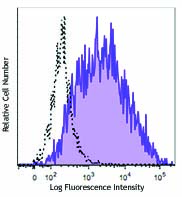
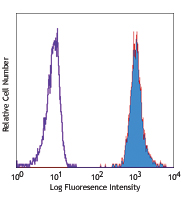
Compare Data Across All Formats
This data display is provided for general comparisons between formats.
Your actual data may vary due to variations in samples, target cells, instruments and their settings, staining conditions, and other factors.
If you need assistance with selecting the best format contact our expert technical support team.
-
Purified anti-human/mouse CXCR7
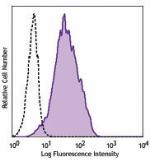
CXCR7 transfected L1.2 cells were stained with purified CXCR... -
PE anti-human/mouse CXCR7
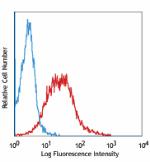
CXCR7 transfected mouse L1.2 cells stained with 8F11-M16 PE -
Biotin anti-human/mouse CXCR7
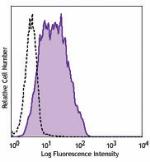
CXCR7 transfected L1.2 cells were stained with biotinylated ... -
APC anti-human/mouse CXCR7
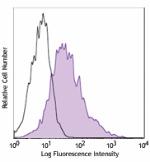
CXCR7 transfected L1.2 cells were stained with CXCR7 (clone ... -
PE/Cyanine7 anti-human/mouse CXCR7
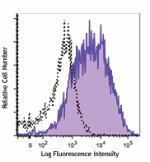
CXCR7 transfected L1.2 cells were stained with CXCR7 (clone ... -
PE/Dazzle™ 594 anti-human/mouse CXCR7
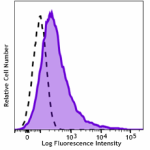
hCXCR7 transfected L5178Y cells were stained with CXCR7 (clo... -
PerCP/Cyanine5.5 anti-human/mouse CXCR7
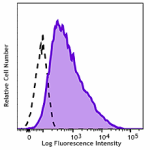
hCXCR7 transfected L5178Y cells were stained with CXCR7 (clo...
 Login / Register
Login / Register 









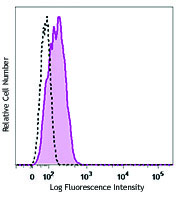
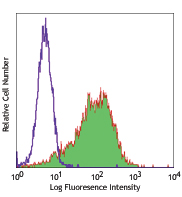



Follow Us